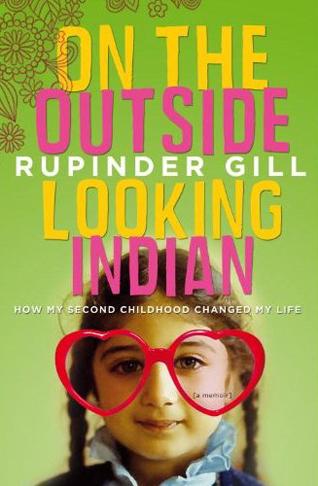Books
On The Outside Looking Indian
A Book Review by EMILY DONALDSON
ON THE OUTSIDE LOOKING INDIAN, by Rupinder Kaur Gill. McClelland & Stewart, 288 pages, $29.99.
Rupinder Kaur Gill’s parents left India for a small, “whiter than snow” Ontario city in Canada in search of that well-worn cliché: a brighter future for their children.
For the first 17 years of Gill’s life, however, most of that brightness came from the television screen in her basement.
The Gills were strict and overprotective of their four daughters.
When the girls weren’t babysitting their baby brother, they were expected to be cleaning house. When it came to personal freedom - whether socializing with friends outside of school, sleepovers (which her parents visualized “as Roman orgies where the sleeping bags were filled with fluffy mounds of cocaine”), dating, outside lessons of any kind, vacations or going on school trips - Gill’s parents raised the word “no” to the level of a mantra.
“No” was Gill’s parents’ stock response, “regardless of whether or not it actually meant anything to them. It was just the easiest way. It saved them money, it saved them the worry, and they seemed to think we would easily get over whatever we were denied and forget that we were ever denied it.”
Countless exceptions were made for Gill’s younger brother, who as the only male child took pride of place in the traditional Sikh family.
Because it kept her safe and indoors, the only indulgence Gill was allowed - if you don’t count copious amounts of junk food - was watching TV. Whether it was Dallas, The A-Team, Three’s Company or The Golden Girls, if it was on the tube, Gill watched it.
Television taught Gill English. Television provided a tantalizing window onto a culture she was barred from.
TV shows are also the inspiration for the book’s excellent chapter titles - “Girls Gone Mild,” “The Facts of No Life,” “Let’s Make a Daal” - that riff on Gill’s predicament.
Gill never complains about not fitting in at school. She describes her friends, rather, as “fun, smart, and kind ... the most popular girls in our grade.” The irony was that countless turned-down invitations left her friends feeling like it was she who was rejecting them.
Gill went on to university and a job - fittingly, as a television publicist - yet she never got over the feeling of having missed key components of a Canadian upbringing. So at the age of 30, she decided to draw up a wish list of missed opportunities and then set out to fulfill them, one by one.
The result is this charming, witty chronicle of the trials and tribulations of one woman’s belated attempt at a second childhood, one whose top priority was learning to swim.
“Indian girls don’t swim,” Gill writes, “because only a fool would think that learning a lifesaving skill is more important than keeping your body hidden forever.”
Getting a pet, going to camp, visiting Disney World and taking dance lessons rounded out the list.
Some wishes naturally proved easier to realize than others.
When Gill’s adult inquiries about attending summer camp are met with widespread incredulity, for example, she decides instead to volunteer with Gilda’s Club, a summer camp for children affected by cancer. The experience goes above and beyond her expectations.
Getting a dog, likewise, gets ruled out after potential toilet training disasters seem to outweigh the possible benefits.
A lifetime of non-participation made confidence the greatest obstacle between Gill and her goals.
Tap dance, swimming and driving lessons seem terrifying at first, although all end up reaping clear rewards. Emboldened by her success, Gill’s takes on an even bigger dream: moving to New York. When her request for a three-month leave of absence is rejected, she simply quits her job and goes.
All of this is fodder for a series of mostly good-natured swipes and zingers aimed at her parents and culture. Given the restrictiveness of her upbringing, it would be hard to blame Gill for sour grapes.
But time appears to have mellowed both sides. While she recognizes her parents’ limitations, Gill is generous in her acknowledgement of their unselfishness, giving them particular credit for not pushing an arranged marriage on her children despite the “bazooka of guilt that for decades they’ve been blasting at unmarried women over 25.”
The end of the book finds Gill at a crossroads back in Toronto. She wants back into the television industry but in a creative role, not a supporting one. That is clearly where she needs to be, and this delightful book couldn’t be a better showcase for her bright comedic talent.
Emily Donaldson is a freelance Toronto writer and editor.
[Courtesy: The Toronto Star]
April 3, 2011
Conversation about this article
1: Harkirat Singh (Brampton, Ontario, Canada), April 03, 2011, 11:05 AM.
This is a sad saga - and, tragically, not an isolated one. There is nothing traditional about these families. Many of them are uneducated. That doesn't mean that the educated ones are immune to such stupidity. There is a pervasive cultural ignorance amongst many, especially those coming from the villages in Punjab ... and there is simply no appreciation of proper parenting. Back home, it was left to the proverbial 'village' to bring up the child. Here, the immigrants are preoccupied with survival, and that is all that receives priority. But to call it "traditional' behaviour is completely missing the real issues. I commend Rupinder for writing the book and bringing everything to the fore. Thank you.
2: Baljit Kaur Sidhu (Brampton, Ontario, Canada.), April 04, 2011, 5:03 PM.
I beg to differ with Harkirat Singh in that I would not classify ALL these parents as uneducated or prone to stupidity. When I grew up in Brampton in the early 70's, there were no 'tanned' people around. My parents immigrated from England. There were 8 such kids at school and all of them were my relatives. My parents were educated, generous to a fault and kind. Yet we too were restricted from all the mainstream activities as girls and our brothers/ cousins were living the life of freedom. Our parents raised us in their best dysfunctional parenting style. They weren't aware of what they were stealing from us - our adolescent life experiences. Eventually we just got used to missing out on a lot, in order to be considered good kids. Yes, we lost some great experiences, but I guess if we really don't want to have any regrets in life, we too can follow Rupinder's great concept of re-living our adolescent years today. Although I must add, years later at age 27, I was allowed to travel to Europe with my best friend, and encouraged to pursue graduate studies abroad. As a parent myself now, I of course want my kids to be able to have all these experiences we missed out on, but back then, there were only a handful of Punjabi families and this form of parenting was considered the norm. As a side note, obviously Rupinder's parents weren't all that bad if she turned out the way she has and has the insight to see them and respect them for who they are.
3: Plate (U.S.A.), April 06, 2011, 3:35 PM.
Rupinder's parents were not that bad. It is better to be strict and control your children's lifestyle, lest they may take a wrong step. I would recommend the following article that appeared in the Wall Street Journal: http://online.wsj.com/article/SB10001424052748704111504576059713528698754.html The article is titled: Why Chinese Mothers Are Superior. However, it can be meant for all mothers who want the best for their children. Rupinder must be applauded for writing a memoir and sharing her experiences.
4: L.S. (Canada), May 05, 2011, 1:18 PM.
I was looking forward to reading this book and was disappointed early on. Quotes like, "I grew up in a town whiter than snow", "only two other Indians in our primary school", "In high school there were a few other Indian kids at my school. They all hung out together" and "didn't understand why I couldn't have it all." - These quotes are extremely exaggerated. Growing up as an Indian at Grand River Collegiate in Kitchener, Ontario, Canada, in the early 1990s was not all that bad. Sure there were comments about facial hair and those who did not understand some of the rules at our Indian homes, but our teachers were amazing and helped us learn about North American culture and helped our "white" friends learn a lot about us as well. As an aside, there were many other "colours" at our school as well, including at least a dozen Indian families. I did not have any Indian friends either, but felt like I had a full experience within my own culture. I don't want to be who I am not, and while just like Rupinder I went to Disney as my first vacation from my full time professional job, I much preferred the family time growing up together, living within our means, having money for rich life experiences you can only have when you are a child. Things are not always better on the inside, and now that my family is gone, I would much rather be outside looking Indian with them, than without them!




